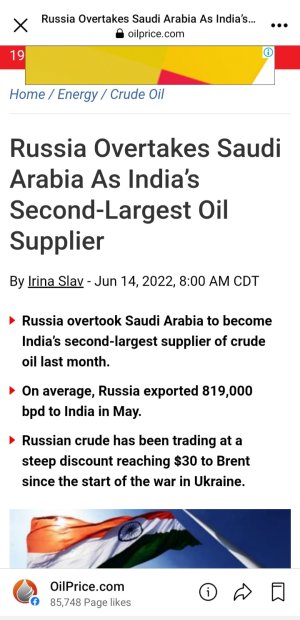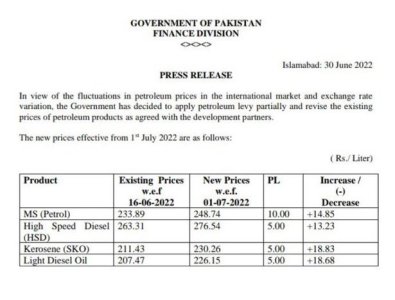A day after fuel prices were increased for the third time in as many weeks, Prime Minister Shehbaz Sharif on Thursday defended the unpopular moves, saying that the government was "left with no choice" because of "those who struck the worst ever deal" with the International Monetary Fund (IMF).
On Wednesday, Finance Minister Miftah Ismail announced an increase in the prices of petroleum products by another Rs24 in an attempt to trim the fiscal deficit and secure critical support from the IMF. Cumulatively, the government has raised petrol prices by Rs84 since May 26, effectively ending the subsidy that the PTI government put in place in February.
The coalition government has, time and again, blamed former prime minister Imran Khan for devising policies that "damaged" the national economy. In his press conference yesterday, Ismail claimed that the PTI government never provided the people with relief when it came to staples such as wheat and pulses during its tenure but chose to reduce oil and petrol prices when it realised that the no-confidence motion would be successful.
In a tweet Thursday morning, the premier admitted that he was aware of the impact that a fuel price hike caused. "Govt is left with no choice but to raise the prices due to IMF deal that PTI govt signed," he said, promising that he would take nation into confidence on the specifics of PTI-IMF deal soon.
"I wonder whether those who struck the worst ever deal with IMF & took patently bad economic decisions have the conscience to face the truth," PM Shehbaz continued. "How can they pretend to be innocent when what the nation is going through is clearly their doing? Details soon."
He further expressed the resolve that Pakistan would get out of these economic difficulties soon.
PTI calls hike 'midnight robbery'
Meanwhile, PTI leaders rejected the price hike and accused the government of being "a hypocrite".
Former finance minister Shaukat Tarin warned that the price hike would push inflation "over 30 per cent" and would "crush" middle to lower income groups.
PTI General Secretary Asad Umar likened the "imported government" to "robbers ". "Just like robbers enter a house in the dark of night, the imported government too plunders the pockets of the petrol via petrol and diesel prices in the dark of night."
Ex-minister Farrukh Habib described the petrol price hike as a "suicide attack" on the people of Pakistan.
"This imported government is not buying petrol from Russia, the cost of which is being paid by the public," he added.
Habib's party leader Imran Khan, has on multiple occasions claimed that Pakistan was poised to purchase discounted oil from Russia but his government was forced out in the vote of no confidence. He has praised India's "independent foreign policy" for buying Russian crude.
The current government insists there was no such agreement in the works.
Meanwhile, senator Faisal Javed stressed on the need to reach out to the public. "It seems as if this is the last month of the incumbent government."
Elections, he continued, have become inevitable now. "To protect (the country) from inflation and destruction, it is important to reach out to the public. Inflation can only be controlled when a government, which has full confidence from the people, is elected. Immediately dissolve assembles, call fresh elections and see how economic indicators improve," Javed suggested.
Former energy minister Hammad Azhar, on the other hand, said that price hike has highlighted the importance of an independent foreign policy in front of everyone.
"Russia is supplying cheap oil to dozens of independent countries but we went to the beggar's ventilator."
https://www.dawn.com/news/1695110/g...az-shifts-blame-on-pti-for-petrol-price-hikes







 mazkhan I love your posts.
mazkhan I love your posts.


